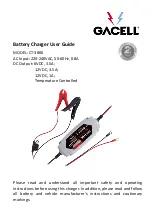
•
The Driver and Passenger Airbag/Inflator Units are
located in the center of the steering wheel and the right
side of the instrument panel. When the ORC and
impact sensors detects a collision requiring the air-
bags, it signals the inflator units. A large quantity of
nontoxic gas is generated to inflate the front airbags.
Different airbag inflation rates may be possible based
on collision severity and occupant size. The steering
wheel hub trim cover and the upper right side of the
instrument panel separate and fold out of the way as
the airbags inflate to their full size. The airbags fully
inflate in about 50–70 milliseconds. This is about half
of the time it takes to blink your eyes. The airbags then
quickly deflate while helping to restrain the driver and
front passenger.
The driver’s and passenger’s front airbag gas is vented
through the airbag material towards the instrument
panel. In this way the airbags do not interfere with
your control of the vehicle.
•
The Side Impact SRS Side Curtain Bags are designed
to activate only in certain side collisions. When the
ORC and the side impact sensors (with side impact
option) detects a collision requiring the window bags
to inflate, it signals the inflators on the crash side of the
vehicle. A quantity of nontoxic gas is generated to
inflate the window bag. The inflating window bag
pushes the outside edge of the headliner out of the
way and covers the window. The airbag inflates in
about 30 milliseconds (about one quarter of the time it
takes to blink your eyes) with enough force to injure
you if you are not belted and seated properly, or if
items are positioned in the area where the window bag
inflates. This especially applies to children. The win-
dow bag is only about 3
1
⁄
2
inches (9 cm) thick when it
is inflated.
64
THINGS TO KNOW BEFORE STARTING YOUR VEHICLE
Summary of Contents for Dodge Caravan 2007
Page 2: ......
Page 5: ...INTRODUCTION 5 1 ...
Page 8: ......
Page 120: ...120 UNDERSTANDING THE FEATURES OF YOUR VEHICLE ...
Page 121: ...UNDERSTANDING THE FEATURES OF YOUR VEHICLE 121 3 ...
Page 122: ...122 UNDERSTANDING THE FEATURES OF YOUR VEHICLE ...
Page 202: ......
Page 208: ...INSTRUMENT PANELS AND CONTROLS 208 UNDERSTANDING YOUR INSTRUMENT PANEL ...
Page 209: ...BASE INSTRUMENT CLUSTER UNDERSTANDING YOUR INSTRUMENT PANEL 209 4 ...
Page 210: ...INSTRUMENT CLUSTER WITH TACH 210 UNDERSTANDING YOUR INSTRUMENT PANEL ...
Page 306: ......
Page 335: ...STARTING AND OPERATING 335 5 ...
Page 393: ...Jack Engagement Locations WHAT TO DO IN EMERGENCIES 393 6 ...
Page 402: ...Jack Engagement Locations 402 WHAT TO DO IN EMERGENCIES ...
Page 414: ...2 4L ENGINE Engine Compartment 2 4L Engine 414 MAINTAINING YOUR VEHICLE ...
Page 415: ...3 3L 3 8L ENGINES Engine Compartment 3 3L 3 8L Engines MAINTAINING YOUR VEHICLE 415 7 ...
Page 464: ......
Page 484: ......
Page 494: ......
Page 495: ...INDEX 10 ...















































